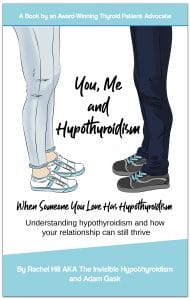Note: I initially wrote this article when my health was in a fairly bad place. I was experiencing thyroid flares a lot.
I use public transport, specifically the tram, to travel to work daily. In the past I have used the bus, and also the train when travelling on business.
Sometimes, public transport can be a nightmare for those living with health conditions, including Hashimoto’s and Hypothyroidism (which I have).
I get the tram to and from work everyday, although some days, I struggle with it.
I can feel shattered from my thyroid condition and barely think straight, due to thyroid brain fog, let alone stand upright easily, and so, as the tram pulls in, I eye up any empty seats I can see through the windows, and get ready to try and get one when the tram doors open.
When I manage to obtain one of these seats, I often get given stares, deep sighs and grunts by those who didn’t make it to the seat in time. Especially if I sit in a ‘priority seat’, which should be given to those who ‘need them most’. And clearly, I don’t look like someone who really needs one because my health conditions aren’t easily visible.
Now, if someone was to get on who I felt deserved the seat more so than myself, and if I was able to stand without major issues (i.e. collapsing), I would of course offer it to them, and I have done so in the past. I am a kind and considerate person whenever I can be, but in most instances, if I was to stand up on this journey, my legs would go to jelly as they’re so weak.
And I am entitled to a seat, just as much as the next person.
There have been tram journeys where I haven’t been able to get a seat, so had to stand. I wobbled around on my weak legs, praying for my stop arrive sooner so I can get off the tram and sit on a seat outside.
I’ve been obviously struggling to stand, and people sat in seats have made awkward eye contact with me, I expect realising that I’m struggling, but they don’t offer me a seat. Instead, they quickly look away. So I sit on the floor, when my legs finally won’t take my weight any longer, but at least I feel safe and don’t have to worry about falling over and making an embarrassment of myself.
Some days, it can really get to me, but other days, I understand that people don’t always know if I’m struggling and require a seat unless I ask. So maybe I should just pluck up the courage to ask.
But then, when I’m reduced to sitting on the floor, you would think that someone would offer a seat. Then why don’t I ask, you might say? Because I’m sick of explaining my health conditions and most days, I don’t have the energy for it. I’m just trying to stay awake and upright.
With trains, whether it’s for business or leisure, I will always book ahead in advance. The main reason for this is so that I have a guaranteed seat.
If I don’t book ahead and reserve a seat, I might have to stand for all or part of the journey, and the last time this happened, it was a ninety minute journey and I almost passed out.
I was un-medicated for my thyroid condition (declared ‘borderline hypothyroid‘) at this point. It was a really hot day, and I was having to stand on a very crowded train, where no windows were available to open.
I didn’t feel fully conscious; lightheaded and very sick. It was a total nightmare as I tried to remain ‘normal’. I couldn’t wait to get to the train station on the other side just to sit on the floor and breathe in some fresh air!
Needless to say, this experience on the train really frightened me, so now I always reserve a seat, whether I’m having a good thyroid day or not. I never fully know how I’m going to feel on the day so it helps to keep my anxiety under control.
An example of when I booked ahead and still struggled with obtaining my seat, though:
On my way back from a work event, I got on a busy train and breathed a huge sigh of relief that I booked in advance, because there were no free seats.
As I located my carriage, I walked up to my seat, and as I saw someone sat in it, anxiety filled my stomach and I became hot and clammy. I’m going to have to ask them to move, I thought.
“Hi, I’ve actually reserved this seat,” I said to the young man, my tone apologetic and awkward. He replied with “Can’t you ask someone else to give their seat to you?”
Astounded, I reply with “No, that’s not the point. I reserved that seat.”
I specifically always reserve a window seat too, as I can feel claustrophobic and panicky, sitting in the aisle.
Without another word, the man sighed, rolled his eyes and made a fuss about having to move himself and his belongings out the train seat.
I wanted to shout at him all the reasons why I reserved this seat, but I knew I shouldn’t have to. I was sick of always needing to feel like I should explain myself.
I was sick of explaining how, just because I may not look obviously sick, it doesn’t mean I’m not entitled to a seat – to the seat I booked and paid for, no less. Even if I was completely healthy, this still wouldn’t be a reasonable reaction from him.
I bit my tongue and didn’t say a word, though. I didn’t feel I needed to justify myself. And although I maybe should have done, to show him up and make people take note, his comments were designed to embarrass me. To make me look selfish and rude, and I wasn’t going to waste my breath explaining when he wouldn’t have cared anyway, and when I shouldn’t have to.
Thankfully, the hypothyroidism, adrenal issues and everything else that comes with it, have gotten better recently, thanks to piecing together my thyroid jigsaw puzzle, but I still have bad days with my health conditions.
You can never tell how well someone is just by looking at them, and people need to stop making these assumptions. Equally, if someone is struggling, people should be aware and much more open to asking them if they’re OK, or if they can help.
A seat is a simple thing, but it can be very much needed by someone struggling with chronic illness.
I have also written another article about my experience of an older woman telling me she was more entitled to a seat than I. Read that here.
Have you experienced any situations like this?
You can click on the hyperlinks in the above post to learn more and see references to information given.
See also:
The book You, Me and Hypothyroidism: When Someone You Love Has Hypothyroidism, for more information on how hypothyroidism affects your loved one, and what can be done to help them live the best quality of life.
***
Please remember that if you’re a thyroid patient living with poor mental health or lingering physical symptoms, that you don’t have to live this way. To address why you may still be feeling unwell (often despite being on thyroid medication too), please see this article and go through each suggestion, putting your thyroid jigsaw back together.






